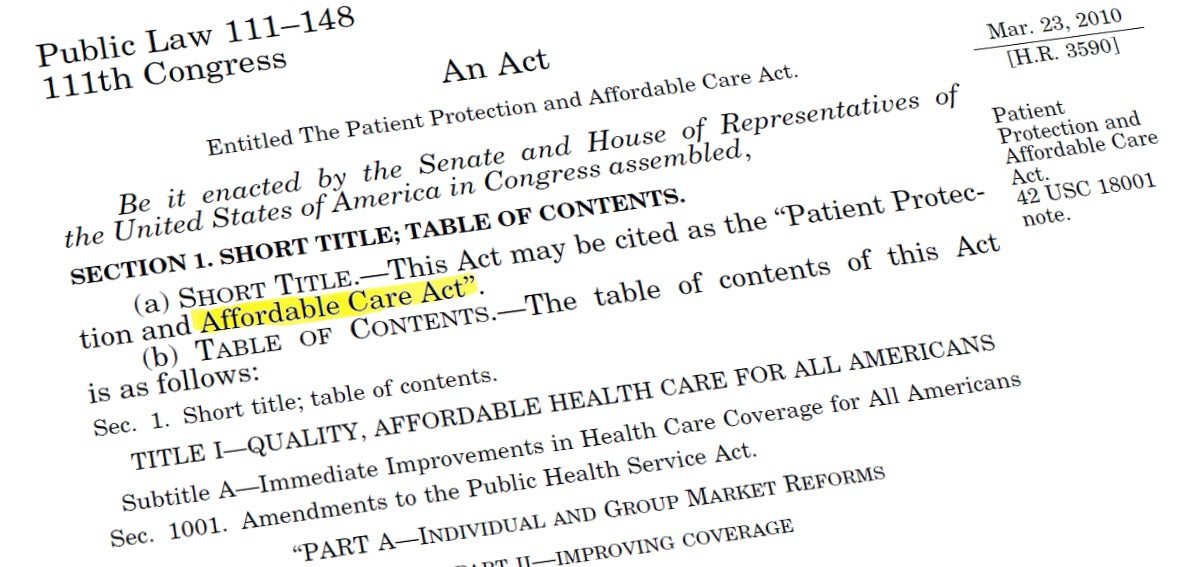

In April, the US unemployment rate rose to 14.7%, surpassing the previous monthly peak of 10% during the Great Recession in 2009. At least 36 million Americans are now jobless — many of them are suddenly without employer-sponsored health insurance. Some may need to obtain health coverage in the individual marketplace or from Medicaid, whose eligibility requirements were greatly expanded under the Affordable Care Act (ACA). And yet, with a global pandemic that has caused more than 88,000 American deaths still raging, the ACA could be overturned by a lawsuit brought by states opposed to the law.
The US Supreme Court will hear a case challenging the health law during its next term, which begins in October. A Texas-led coalition of 18 states with Republican governors sued to overturn the ACA in 2018, and the case has been slowly making its way through the courts. If the high court rules the ACA unconstitutional, vital sources of health care coverage could be stripped away at a time when it is more critical than ever.
On May 6, House Democrats filed a brief (PDF) with the court that underscored the importance of the ACA during the coronavirus pandemic. “The nation’s current public-health emergency has made it impossible to deny that broad access to affordable health care is not just a life-or-death matter for millions of Americans, but an indispensable precondition to the social intercourse on which our security, welfare, and liberty ultimately depend,” the Democrats wrote.
A California-led coalition of 20 states plus Washington, DC, is defending the ACA. “A global pandemic is the time to wake up and protect the lives of our loved ones, yet all we see from the President’s team is repeal without replace,” California attorney general Xavier Becerra said in a statement announcing the coalition’s own brief (PDF).
High-level Republicans are pushing back against the Trump administration’s pivotal support for the lawsuit. US Attorney General Bill Barr asked the Trump administration to “back off the suit due to the political ramifications of undermining the ACA during the pandemic,” Rebecca Pifer reported in Healthcare Dive. On NBC’s Meet the Press, Senate Health Committee Chairman Lamar Alexander (R-TN) expressed his disapproval of the administration’s decision to continue supporting the lawsuit, Axios reported. Although the White House has not provided an alternative to the ACA in the event it is struck down, the president has rejected their advice. “We’re staying with Texas and the group,” he told reporters.
Protections Offered by ACA at Risk
A new KFF analysis estimates that nearly 27 million Americans could lose their employer-sponsored insurance following job loss during the COVID-19 recession. This total includes newly unemployed workers and their dependents. In California alone, some 3.4 million residents could lose job-based health coverage. About half (12.7 million) of the Americans who become uninsured after job loss could be eligible for Medicaid, according to the analysis. An estimated 8.4 million others would be eligible for marketplace subsidies for the rest of the calendar year.
But those protections are all contingent on the continued existence of the ACA. Without the health law, “upwards of 20 million people would lose coverage, [and] millions losing jobs would not have options to stay insured,” Larry Levitt, executive vice president for health policy at KFF, wrote in a tweet.
Furthermore, without the ACA, “people who recovered from COVID-19 and tried to purchase an individual health insurance policy could be turned down, charged higher premiums, or have follow-up care excluded from coverage,” Ricardo Alonso-Zaldivar wrote for the AP. This is because consumer insurance protections — including those for people with preexisting conditions — are a key provision of the health law.
Other key provisions include the Medicaid expansion, various free preventive health services, coverage for young adults up to age 26, and more. The list of benefits that are now at risk is so long that “I haven’t really gone through the full list yet,” legal expert Katie Keith told Dana Elfin in Healthcare Dive. “If we get a final decision that the law is invalidated, it will wreak havoc in the health care system,” Keith said.
Medicaid Expansion States Fare Better
Since the ACA’s Medicaid expansion took effect in 2014, numerous studies have linked it to better health outcomes, improved family finances, and reduced mortality rates. Now, states that expanded Medicaid eligibility to their poorest residents may have another leg up on states that resisted expanding Medicaid: a health care safety net for newly unemployed residents in the midst of the COVID-19 crisis.
An issue brief prepared for the Robert Wood Johnson Foundation by the Urban Institute estimated that, in states that expanded Medicaid, more than half of the people who lose their job-based health insurance will gain coverage through Medicaid, compared to only one-third of their counterparts in non-expansion states. Additionally, in states that expanded Medicaid, less than 25% of the people who lose their job-based health coverage will become uninsured, compared to about 40% of their counterparts in non-expansion states.
“Those newly uninsured people will be less likely to seek necessary medical care . . . and more likely to face financial catastrophe if they do have a medical emergency — coronavirus-related or otherwise,” Dylan Scott reported in Vox.
California Has a Tough Row
Even without a lawsuit that threatens the ACA, public health insurance may be endangered by the economic fall-out from the COVID-19 pandemic.
Enrollment in Medicaid tends to go up when the economy worsens, leaving states with increased Medicaid spending while tax revenues plummet. With millions of people likely to enroll in Medicaid in coming months, state officials across the nation are worried that they will have to cut back state spending on the program because of the economic downturn.
In California, Medi-Cal enrollment is expected to peak in July, with about 14.5 million Californians signed up, Kaiser Health News reported.
On May 14, Newsom released his revised 2020-21 state budget (PDF), which is a response to the harsh realities of COVID-19’s economic impact.
“We have been making historic investments in the last many years in the state of California,” Newsom said during his budget briefing. “And now being forced back into this position to make cuts breaks my heart.”
If the ACA is struck down, the state’s policymakers will face even tougher economic and budget choices.
Authors & Contributors




